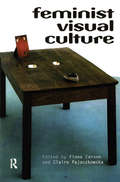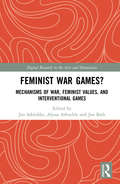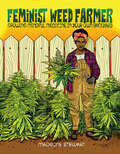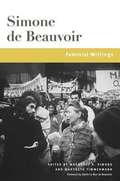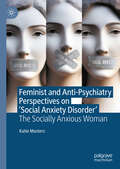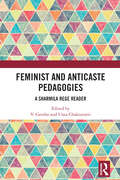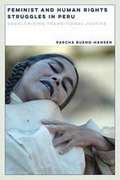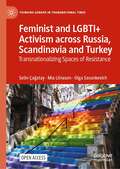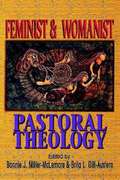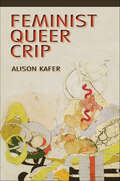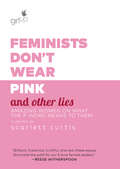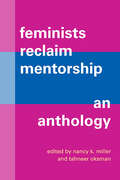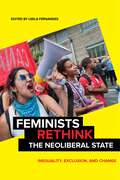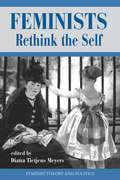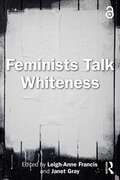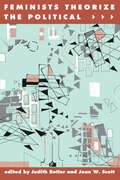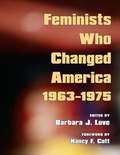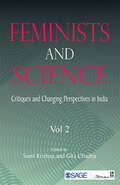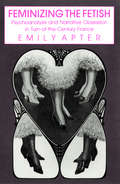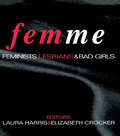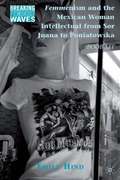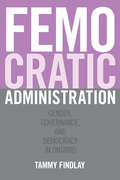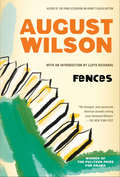- Table View
- List View
Feminist Visual Culture
by Fiona Carson Claire PajaczkowskaFirst Published in 2001. Routledge is an imprint of Taylor & Francis, an informa company.
Feminist War Games?: Mechanisms of War, Feminist Values, and Interventional Games (Digital Research in the Arts and Humanities)
by Jon Saklofske Alyssa Arbuckle Jon BathFeminist War Games? explores the critical intersections and collisions between feminist values and perceptions of war, by asking whether feminist values can be asserted as interventional approaches to the design, play, and analysis of games that focus on armed conflict and economies of violence. Focusing on the ways that games, both digital and table-top, can function as narratives, arguments, methods, and instruments of research, the volume demonstrates the impact of computing technologies on our perceptions, ideologies, and actions. Exploring the compatibility between feminist values and systems of war through games is a unique way to pose destabilizing questions, solutions, and approaches; to prototype alternative narratives; and to challenge current idealizations and assumptions. Positing that feminist values can be asserted as a critical method of design, as an ideological design influence, and as a lens that determines how designers and players interact with and within arenas of war, the book addresses the persistence and brutality of war and issues surrounding violence in games, whilst also considering the place and purpose of video games in our cultural moment. Feminist War Games? is a timely volume that questions the often-toxic nature of online and gaming cultures. As such, the book will appeal to a broad variety of disciplinary interests, including sociology, education, psychology, literature, history, politics, game studies, digital humanities, media and cultural studies, and gender studies, as well as those interested in playing, or designing, socially engaged games.
Feminist Weed Farmer: Growing Mindful Medicine in Your Own Backyard
by Madrone StewartWeed is a powerful medicine, and growing your own is as empowering as it gets. Experienced Humboldt farmer Madrone Stewart, shares her hard-won knowledge gained from years of growing cannabis, Zen meditation, and surviving as a woman in a male-dominated industry. She walks you through the big picture and details of growing six backyard plants, from selecting seeds to harvesting and processing. Humorous, sage, and with a big heart, each chapter is infused with what she's learned about equalizing the weed industry, applying mindfulness to pest management, and the importance of owning each step of the process. If you've ever wanted to grow your own pot or make hash or kief at home, this book is your wise guide.
Feminist Writings
by Simone De Beauvoir Sylvie Le Beauvoir Margaret A. Simons Marybeth TimmermannBy turns surprising and revelatory, this sixth volume in the Beauvoir Series presents newly discovered writings and lectures while providing new translations and contexts for Simone de Beauvoir's more familiar writings. Spanning Beauvoir's career from the 1940s through 1986, the pieces explain the paradoxes in her political and feminist stances, including her famous 1972 announcement of a "conversion to feminism" after decades of activism on behalf of women. Feminist Writings documents and contextualizes Beauvoir's thinking, writing, public statements, and activities in the services of causes like French divorce law reform and the rights of women in the Iranian Revolution. In addition, the volume provides new insights into Beauvoir's complex thinking and illuminates her historic role in linking the movements for sexual freedom, sexual equality, homosexual rights, and women's rights in France.
Feminist and Anti-Psychiatry Perspectives on ‘Social Anxiety Disorder’: The Socially Anxious Woman
by Katie MastersThis book conceptualises the diagnosis ‘Social Anxiety Disorder’ (SAD) in women as a rational response to life in postfeminist, neoliberal, twenty-first century Britain. By speaking to women with this diagnosis, and drawing on the author’s lived experience, it investigates the interplay between women’s social anxiety and Western culture. It argues that societal factors are implicated in women’s mental distress to a far greater extent than dominant (especially psychiatric) narratives would hold—narratives which, premised on individual pathology, often present a biologically reductionist and medicalised account. Through deploying a unique blend of feminism and anti-psychiatry, this book critiques the framework which exists around diagnosing and treating SAD, but without dismissing distress. Inspired by feminist critiques of other gendered psychiatric diagnoses, such as Anorexia Nervosa, it conceptualises ‘SAD’ in women as a ‘culture-bound syndrome’. This book will interest students and scholars of gender studies and sociology.
Feminist and Anticaste Pedagogies: A Sharmila Rege Reader
by Uma Chakravarti V. GeethaThis book comprises the collected essays of Sharmila Rege (1964 – 2013), which span a range of themes, including critical perspectives on women’s movements, Dalit standpoint feminism, and the relationship between Women’s Studies and other disciplines. Written over two decades and more (from the 1990s to 2010), these pioneering essays draw from the struggles and writings of Dalit women, the long history of anticaste thought in Maharashtra and global feminist debates. Equally, they address enduring concerns to do with caste and gender, and call attention to the inseparability of struggles against caste and patriarchy.Framed and annotated by an introduction that places Sharmila's work in the intellectual and historical contexts that shaped it, the volume also features short prefatory notes by her colleagues on the various themes taken up for discussion. Addressing, as it does, the researcher, the activist and the teacher, the book is indispensable for students and researchers of women’s studies, feminism, gender studies, Dalit studies, minority studies, Sociology, as well as studies in language and rhetoric.
Feminist and Human Rights Struggles in Peru: Decolonizing Transitional Justice
by Pascha Bueno-HansenIn 2001, following a generation of armed conflict and authoritarian rule, the Peruvian state created a Truth and Reconciliation Committee (TRC). Pascha Bueno-Hansen places the TRC, feminist and human rights movements, and related non-governmental organizations within an international and historical context to expose the difficulties in addressing gender-based violence. Her innovative theoretical and methodological framework based on decolonial feminism and a critical engagement with intersectionality facilitates an in-depth examination of the Peruvian transitional justice process based on field studies and archival research. Bueno-Hansen uncovers the colonial mappings and linear temporality underlying transitional justice efforts and illustrates why transitional justice mechanisms must reckon with the societal roots of atrocities, if they are to result in true and lasting social transformation. Original and bold, Feminist and Human Rights Struggles in Peru elucidates the tension between the promise of transitional justice and persistent inequality and impunity.
Feminist and LGBTI+ Activism across Russia, Scandinavia and Turkey: Transnationalizing Spaces of Resistance (Thinking Gender in Transnational Times)
by Mia Liinason Olga Sasunkevich Selin ÇağatayWhat do struggles for women’s and LGBTI+ rights in Russia, Turkey and the Scandinavian countries have in common? And what can actors who struggle for rights and justice in these contexts learn from each other? Based on a multisited ethnography of feminist and LGBTI+ activisms across Russia, Turkey and the Scandinavian countries, this Open Access book explores transnational struggles on various levels, from the micro-scale of the everyday to large-scale, spectacular events. Drawing on ethnographic insights and encounters from various sites, this book conceptualizes resistance as situated in the grey zone between barely perceptible, even hidden or covert, forms of mundane activist practices and highly visible street protests, gathering large crowds. Taking the reader beyond the dichotomies of visible/invisible and public/private, this book advances new understandings of resistance, solidarity, and activism in transnationalizing feminist and queer struggles, illustrated by rich ethnographic case studies from Russia, Scandinavia and Turkey.
Feminist and Womanist Pastoral Theology
by Bonnie J. Miller-McLemore Brita L. Gill-AusternIn the last decade, the focus of pastoral theology has shifted dramatically from care defined as counseling to care understood within a wider social, political, and religious context. Feminist and womanist theory as well as feminist and womanist faith convictions have played a key role in this development. According to the authors, feminists and womanists in pastoral theology have begun to reconstruct the definitions, parameters, and commitments of pastoral care and counseling. These changes have critical implications for care within congregations and for the understanding of theology in seminaries and divinity schools. Yet these developments in the theory and practice of pastoral theology and their broader ramifications have not been carefully analyzed or even acknowledged by pastoral theologian, minister, and religion scholar alike. This is due to a failure to articulate clear understandings of the field, the gap between congregational ministry and higher education in religion, and conflicts in theological education in general over the place of practice and theory, experience, spirituality, and practical theology. To redress these problems, this collection of essays has a threefold aim. First, the book identifies the many changes occurring in definitions of pastoral theology, care, and counseling. Second, the volume defines and develops new methods and approaches. Third, the authors attend to the implications of these changes for congregational care and theological education. Roughly speaking, the order of the chapters in this volume follows this threefold agenda, moving from an exploration of the changes in pastoral theology to its reconstruction to some of the implications of recent innovations
Feminist, Queer, Crip
by Alison KaferIn Feminist, Queer, Crip Alison Kafer imagines a different future for disability and disabled bodies. Challenging the ways in which ideas about the future and time have been deployed in the service of compulsory able-bodiedness and able-mindedness, Kafer rejects the idea of disability as a pre-determined limit. She juxtaposes theories, movements, and identities such as environmental justice, reproductive justice, cyborg theory, transgender politics, and disability that are typically discussed in isolation and envisions new possibilities for crip futures and feminist/queer/crip alliances. This bold book goes against the grain of normalization and promotes a political framework for a more just world.
Feminists Don't Wear Pink and Other Lies: Amazing Women on What the F-Word Means to Them
by Scarlett CurtisAn urgent and inspirational collection of essays by a diverse group of celebrities, activists, and artists about what feminism means to them, with the goal of helping readers come to their own personal understanding of the word.“Brilliant, hysterical, truthful, and real, these essays illuminate the path for our future female leaders.”—Reese Witherspoon “As a feminist who loves pink, I give this brilliant book of essays an enthusiastic ‘YES.’”—Mindy Kaling Feminists Don’t Wear Pink and Other Lies is a collection of writing from extraordinary women, from Hollywood actresses to teenage activists, each telling the story of her personal relationship with feminism. Often funny, sometimes surprising, and always inspiring, this book aims to bridge the gap between the feminist hashtag and the scholarly text by giving women the space to explain how they actually feel about feminism. Published in partnership with Girl Up, a campaign of the United Nations Foundation, and curated by writer and Pink Protest founder Scarlett Curtis, this book’s contributors include: Bridget Jones (by Helen Fielding) • Saoirse Ronan • Emma Watson • Jameela Jamil • Kat Dennings • Keira Knightley • Alicia Garza • Jodie Whittaker • Whitney Wolfe Herd • Beanie Feldstein • Zoe Sugg • Angela Yee • Akilah Hughes • Evanna Lynch • Chimwemwe Chiweza • Alison Sudol • Lolly Adefope • Elyse Fox • Charlie Craggs • Charlotte Elizabeth • Alaa Murabit • Trisha Shetty • Tapiwa Maoni • Lydia Wilson • Amy Trigg • Tanya Burr • Karen Gillan • Swati Sharma • Bronwen Brenner • Emily Odesser • Emi Mahmoud • Gemma Arterton • Lauren Woodhouse-Laskonis • Tasha Bishop • Skai Jackson • Maryam and Nivaal Rehman • Nimco Ali • Amika George • Jordan Hewson • Alice Wroe • Claire Horn • Dolly Alderton • Rhyannon Styles • Grace Campbell • Liv Little • Olivia Perez
Feminists Reclaim Mentorship: An Anthology (SUNY series in Feminist Criticism and Theory)
by Nancy K. Miller Tahneer OksmanMentorship continues to loom large in stories about women's work and personal lives— sometimes for the better, but often for the worse. If mentors can nurture and support, they can also bitterly disappoint, reproducing the hardships they once suffered and reinforcing the same old hierarchies and inequities. The stories gathered in Feminists Reclaim Mentorship challenge our fundamental assumptions about mentorship, illuminating the obstacles that make it difficult to connect meaningfully and ethically while reimagining the possibilities for reciprocity. Does mentorship require sameness? Might we find more inventive, collaborative ways to bond than the traditional top-down model of mentoring? Drawing on their experiences in academia, creative writing, publishing, and journalism, the volume's editors, Nancy K. Miller and Tahneer Oksman, and their twenty-six contributors collectively strive for relationships that acknowledge differences alongside the importance of common bonds. Feminists Reclaim Mentorship will resonate across workspaces and arrives at a moment when the need to form feminist connections within and between generations couldn't feel more urgent.
Feminists Rethink the Neoliberal State: Inequality, Exclusion, and Change
by Leela FernandesA rich set of feminist perspectives on the varied and often contradictory nature of state practices, structures, and ideologies Growing socio-economic inequality and exclusion are defining features of the twenty-first century. While debates on globalization, free trade, and economic development have been linked to the paradigm of “neo-liberalism,” it does not explain all the forms of social change that have been unfolding in comparative contexts. Feminists Rethink the Neoliberal State provides a timely intervention into discussions about the boundaries, practices, and nature of the post-liberalization state, suggesting that an understanding of economic policies, the corresponding rise of socio-economic inequality, and the possibilities for change requires an in-depth reconceptualization.Drawing on original field research both globally and within the United States, this volume brings together a rich set of perspectives on the varied and often contradictory nature of state practices, structures and ideologies in the post-liberalization era. The essays develop an interdisciplinary approach that treats an understanding of historically-specific forms of inequality—such as gender, race, caste, sexuality and class—as integral to, rather than as after-effects of, the policies and ideologies associated with the “neoliberal project.” The volume also tackles central questions on the restructuring of the state, the state’s power operations, the relationship between capital and the state, and its interactions with the institutions and organizational forms of civil society in the post-liberalization era. As such, Feminists Rethink the Neoliberal State examines both what is distinctive about this post-liberalization state and what must be contextualized as long-standing features of modern state power. A truly international and interdisciplinary volume, Feminists Rethink the Neoliberal State deepens our understanding of how policies of economic liberalization shape and produce various forms of inequality.
Feminists Rethink the Self (Feminist Theory and Politics)
by Diana T Meyers<p>How is women's conception of self affected by the caregiving responsibilities traditionally assigned to them and by the personal vulnerabilities imposed on them? If institutions of male dominance profoundly influence women's lives and minds, how can women form judgments about their own best interests and overcome oppression? Can feminist politics survive in face of the diversity of women's experience, which is shaped by race, class, ethnicity, and sexual orientation, as well as by gender? Exploring such questions, leading feminist thinkers have reinvigorated work on the concept of self and personal identity, as demonstrated by the discussions in this insightful volume. <p>The concerns that animate feminist scholarship have prompted feminist philosophers to sideline the theme of individualism and to focus on the theme of intersubjectivity. In conceptualizing the self, the contributors to this volume highlight emotional bonds among people, the stories people tell one another, and the systems of categories and behavioral norms that unite and divide groups of people. Topics addressed include sexual violence and the self, the social self and autonomy, the narrative self and integrity, self-ownership and the body, forgetting yourself and your race, group membership and personal identity, grief and gender, sympathy and women's diversity, emotion and emancipatory epistemology, and dependency and justice. This volume will be important reading for students of feminist theory, ethics, and social and political philosophy.</p>
Feminists Talk Whiteness
by Janet Gray Leigh-Anne FrancisFeminists Talk Whiteness offers a multidimensional introduction to whiteness as an ideology and a system of institutional practices, exploring how and why whiteness is a feminist issue.Readers will gain insights and strategies for action from the chapters and poems, which approach whiteness through multiple perspectives and disciplinary approaches. The contents are organized into sections on history, theory and self-reflection, and antiracist praxis. Each section includes suggested questions for writing or discussion, as well as varied activities—from quick research to community action.Feminists Talk Whiteness is for college students, community groups, and book clubs studying whiteness and antiracism. It will work well as a main or companion text in courses in women’s, gender, and feminist studies, as well as other courses across the humanities and social sciences.The Open Access version of this book, available at http://www.taylorfrancis.com, has been made available under a Creative Commons Attribution-Non Commercial-No Derivatives (CC-BY-NC-ND) 4.0 license.
Feminists Theorize the Political
by Joan W. Scott Judith ButlerFirst published in 1992. Routledge is an imprint of Taylor & Francis, an informa company.
Feminists Who Changed America, 1963-1975
by Nancy F. Cott Barbara J. LoveDocumenting key feminists who ignited the second wave women's movement Barbara J. Love's Feminists Who Changed America, 1963-1975 will be the first comprehensive directory to document many of the founders and leaders (including both well-known and grassroots organizers) of the second wave women's movement. It tells the stories of more than two thousand individual women and a few notable men who together reignited the women's movement and made permanent changes to entrenched customs and laws. The biographical entries on these pioneering feminists represent their many factions, all parts of the country, all races and ethnic groups, and all political ideologies. Nancy Cott's foreword discusses the movement in relation to the earlier first wave and presents a brief overview of the second wave in the context of other contemporaneous social movements.
Feminists and Science: Critiques and Changing Perspectives in India (Feminists and Science)
by Sumi Krishna and Gita ChadhaA feminist analysis of the gendered concepts and practices of science, showing how science and technology impact women’s bodies, lives and work Feminists and Science, volume 2, critiques the relationship between science, gender and patriarchies in the Indian context from a multi-disciplinary perspective. This volume addresses the complexity of local knowledge and the politics of knowledge-making, interrogates how creativity and the practices of science are gendered, explores the methodologies of doing science differently and moves towards a more inclusive pedagogy. It draws upon the experience of how science and technology has impacted Indian women, going beyond the problems of women scientists in institutions, and offers a pioneering contribution to both science and women’s studies.
Feminizing the Fetish: Psychoanalysis and Narrative Obsession in Turn-of-the Century France
by Emily ApterShoes, gloves, umbrellas, cigars that are not just objects—the topic of fetishism seems both bizarre and inevitable. In this venturesome and provocative book, Emily Apter offers a fresh account of the complex relationship between representation and sexual obsession in turn-of-the-century French culture. Analyzing works by authors in the naturalist and realist traditions as well as making use of documents from a contemporary medical archive, she considers fetishism as a cultural artifact and as a subgenre of realist fiction. Apter traces the web of connections among fin-de-siècle representations of perversion, the fiction of pathology, and the literary case history. She explores in particular the theme of "female fetishism" in the context of the feminine culture of mourning, collecting, and dressing.
Femme: Feminists, Lesbians and Bad Girls
by Laura Harris Elizabeth CrockerFemme seeks to redress the ways that femme identities have been elided, idealized, or not fully historicized in a productive reconsideration of lesbian and butch-femme history, of feminism, and of queer thought. As a feminist project, Femme offers an alliance between many communities of women previously passed over by feminism. Contributors: Leah Lilith Albrecht-Samarasinha, Barbara Cruikshank, Madeline Davis, Heather Findlay, Jewelle Gomez, Kelly Hankin, Leslie Henson, Amber Hollibaugh, Elizabeth Lapovsky Kennedy, Mabel Maney, Katherine Millersdaughter, Joan Nestle, Lisa Ortiz, Minnie Bruce Pratt, Rebecca Ann Rugg, Gaby Sandoval, Marcy Sheiner, Alex Robertson Textor.
Femmenism and the Mexican woman intellectual from Sor Juana to Poniatowska: Boob Lit
by Emily HindHind draws on poetry, short stories, plays, novels, photographs, personal correspondence, advertising, and interviews to make visible the anti-feminine tendencies in femmenism and to imagine a femmenism that will appeal to the next generation of women.
Femmes Fatales
by Mary Ann DoaneIn this work of feminist film criticism, Mary Ann Doane examines questions of sexual difference and knowledge in cinematic, theoretical, and psychoanalytic discourses. "Femmes Fatales" examines Freud, the female spectator, the meaning of the close-up, and the nature of stardom. Doane's analyses of such figures as Pabst's Lulu and Rita Hayworth's Gilda trace the thematics and mechanics of maskes, masquerade, and veiling, with specific attention to the form and technology of the cinema. Working through and against the intellectual frameworks of post-structuralist and psychoanalytic theory, Doane interrogates cinematic and theoretical claims to truth about women which rely on judgements about vision and its stability or instability. Reflecting the shift in conceptual priorities within feminist film theory over the last decade, "Femmes Fatales" addresses debates over female spectatorhsip, essentialism and anti-essentialism, the tensions between psychoanalysis and history, and the relations between racial and sexual difference. Doane's nuanced and original readings of the "femme fatale" in cinema illustrate confrontations between feminism, film theory and psychoanalysis. This book should be of interest to students and lecturers in women's studies, communications studies and film theory.
Femmes d’Écosse
by Helen Susan Swift Nicolas FrebillotFemmes d’Écosse est un voyage à travers le temps à la découverte de ces femmes qui ont fait l’histoire de leur pays. Des plus humbles aux plus grandes, les écossaises ont été sur le devant de la scène et en arrière-plan des principaux événements de leur pays. Voici les pêcheuses, les guerrières, les écrivains, les jacobites, les martyres et les ouvrières. Sans elles, l’Écosse ne serait pas l’Écosse. Rejoignez cette formidable épopée à travers les Âges Sombres et ce XXIème siècle et découvrez qui fut la force motrice de cette petite mais dynamique nation.
Femocratic Administration
by Tammy FindlayFemocratic Administration examines the gendered nature of public administration through a study of the Ontario Women's Directorate (OWD) between 1985 and 2000. Analysing the OWD from the perspective of feminist political economy, this book combines a detailed case study with a theoretical framework that reconceptualizes the meanings of state feminism, representation, and democracy.Using interviews and archival materials, Tammy Findlay argues that the feminist bureaucrats (or "femocrats," as they are sometimes known) of the OWD were marginalized even before the rise of neoliberal governance and New Public Management of the 1990s. Achieving substantive democracy for Ontario's women, she contends, requires more than just institutional reforms - it demands "femocratic administration" that transforms the entire public service and its relationship with citizens.
Fences: A Play
by August WilsonFrom legendary playwright August Wilson comes the powerful, stunning dramatic bestseller that won him critical acclaim, including the Tony Award for Best Play and the Pulitzer Prize.Troy Maxson is a strong man, a hard man. He has had to be to survive. Troy Maxson has gone through life in an America where to be proud and black is to face pressures that could crush a man, body and soul. But the 1950s are yielding to the new spirit of liberation in the 1960s, a spirit that is changing the world Troy Maxson has learned to deal with the only way he can, a spirit that is making him a stranger, angry and afraid, in a world he never knew and to a wife and son he understands less and less. This is a modern classic, a book that deals with the impossibly difficult themes of race in America, set during the Civil Rights Movement of the 1950s and 60s. Now an Academy Award-winning film directed by and starring Denzel Washington, along with Academy Award and Golden Globe winner Viola Davis.
